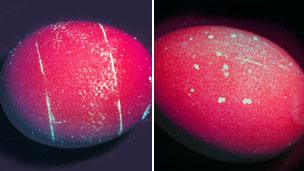Egg farmers 'failed by ministers' over illegal EU eggs
- Published

Ultra-violet light shows up wire marks, from battery cages, on an illegal egg (left)
The UK egg industry says it feels "totally let down" by ministers after they failed to ban imports of illegally produced eggs from Europe.
An EU-wide ban on battery hens comes into force in January, but 13 out of 27 nations say they will not comply.
The government says it has taken steps to protect UK farmers from being undercut - by gaining agreement from supermarkets not to use illegal eggs.
But it said a unilateral ban in the UK was "not a realistic option".
The ban on battery hens, due to come into force on 1 January, was announced in 1999.
It prevents animals being kept in cages with less that 45 cm of headroom and 750 square cm floor space per hen. New cages must also be equipped with a nest and litter to allow pecking and scratching.
UV light
Agriculture Minister James Paice told the BBC that producers across Europe had been given plenty of time to meet the new rules, but many had failed to do so.
"Our producers in the UK have done so - we believe they've spent about £400m in getting rid of conventional cages, replacing them with much more welfare-friendly systems," he said.
"What matters is that our producers are protected from being undercut by cheap eggs from illegal systems."
The sale of battery eggs will be illegal across the Europe from January, and the government says it will use tests involving ultra violet light to spot any that slip through the net.
The UV light will pick up any wire marks on the egg shells - formed when they are laid in battery cages.
However, there is concern that powdered or liquid egg from battery hens - which is harder to trace - could still be used in baked goods and confectionery.
Mr Paice said it was that loophole that he had worked hard to close by teaming up with industry.
"All the major supermarkets have promised not only that they won't sell eggs from illegal cages, but more important they've promised to ensure that all egg product that's used to manufacture their own label bakery and confectionery products also comes from lawful systems."
The minister also said most of the country's major food manufacturers and importers had agreed to only source their eggs from legal sources.
'Lack of will'
But the British Egg Industry Council says that is not good enough and the government could have introduced a complete ban on all illegal egg products in the UK.
Chief executive Mark Williams said: "The UK egg industry feels totally let down by the government. Whilst we have received repeated platitudes of support from Defra, it has failed to back these up with any real action.
"Our legal advice has confirmed that the UK government is able to enforce UK and EU law by banning illegal eggs and egg products - so why have they chickened out?
"British egg producers have invested heavily to meet their legal obligations, only to see their efforts jeopardised by an apparent lack of political will."
The government said it had "thoroughly investigated the possibility of taking unilateral action and bringing in a UK ban on all imports of egg and egg products".
"However, given the very significant legal and financial implications of introducing such a ban, coupled with practical difficulties in enforcing it, it is not a realistic option," it said in a statement.
Mr Paice said the UK had urged the European Commission to ban any non-compliant country from exporting any eggs or egg products altogether, "but unfortunately they refused to do so".
The UK is 82% self sufficient in egg and egg products, with the remaining 18% coming from other EU states.
But the Shadow Farming Minister Huw Irranca-Davies says the government has not gone far enough.
"People will rightly be sceptical about the Government's plans for UV border control checks for illegal eggs," he said.
"The Government has only announced today that they are changing their own Buying Standards to exclude battery eggs, a process that will take many months to achieve if their past performance is anything to go by.
"Labour wants the government to publish a rolling register of retailers and manufacturers who have signed up to a total ban, so that British shoppers can have confidence they are eating eggs from happy hens."
- Published13 June 2011